Authors: Lea Gallagher 405.458.0408 and Rie Brosco 215.435.5609
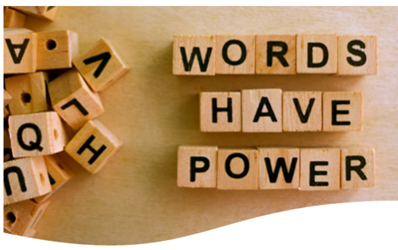
When it comes to an organizing project (or really, anything in life), the words we say out loud or think in our heads can either empower us or hold us back. Today, we want to share with you three words we loathe and three words we love. They apply to the work we do helping clients organize their space, and they have broader application in life as well.
REDUCE THE USE OF THESE THREE WORDS WE LOATHE
Maximize. Hello, corporate speak! Does anybody else think this word sounds a little soulless? When you hear the word maximize, does it imply that the only way to operate is at 100% or 110%? But everyone needs wiggle room and flexibility! We don’t need to be everything to everyone all the time, and that’s what maximize makes us think of.
Productivity. This word goes right with maximize as it is often paired together, as in maximizing productivity. It’s pretty ingrained in American culture that we need to be productive. But we are all worth more than our productivity! Don’t connect your self worth to how much you can produce for someone else. I’m in full support of efficiency, but not productivity at a negative cost or impact. Remember, sometimes the best thing is to NOT be productive. Down time rejuvenates the soul and helps make the time when we are working on a project more fruitful.
Perfect / Should. Okay, that’s two words, but they’re related. There’s no such thing as perfect, and all too often, we set unrealistic expectations of ourselves to try and reach that impossible standard. And in seeking perfection, we create a lot of “shoulds” for ourselves: we should do this or we should do that. A friend of mine often says, “Don’t should on yourself.” Just for a day, keep track of how many times you think or say you should do something. Bet you’ll be surprised by the weight you’re putting on yourself unnecessarily.
REUSE THE USE OF THESE THREE WORDS WE LOVE
Progress. This one’s about the continuous journey! We are all works in progress. We’re on our own path and at various spots along the way. Progress feels hopeful and implies growth and forward movement. And it’s okay if your progress isn’t always linear and doesn’t look like somebody else’s progress. What matters is that you’re making progress for you.
Can. A much better word than should! If you believe you can or if you believe you can’t, you’re right. It’s more of an active choice versus the burden of should. We can choose to do something. We can also choose not to do something. There’s a difference between, “I should do the dishes,” and “I can do the dishes because I want my sink to be clean.”
Enough. This one’s empowering to me (Lea) as a recovering perfectionist. Each of us gets to decide what’s good enough or what’s done enough for us. There’s wiggle room! It also implies that there’s a stopping point where you can shift your focus to other things like relaxing or spending time with family or being creative. If you spend all your time on one thing until it’s perfect, it may never be good enough and you will be neglecting everything else. And perfect isn’t actually possible, so you’re missing out for no reason. Focus on what’s enough and move on.
In today’s world where we all try to reduce, reuse and recycle as much as possible to save and improve our environment, we encourage all of us to reduce and recycle the use of the words we loathe. Instead, strive to reuse the words we love and expand the joy in our lives.
| Between the ups and downs of the COVID-19 pandemic and the political tension, the past several months have been especially stressful. There are many ways that people handle stress. Some make To-Do lists. |
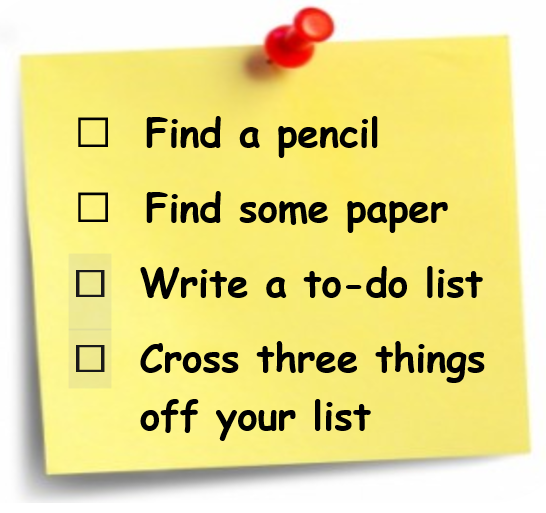
| For instance, what does one do with old (clean) socks? You know the ones… the dryer has eaten the mate or the elastic has lost its stretch. Below are some ideas of what you can do with socks. Not only can you enjoy some of these projects, beautify your home and/or enlist the aid of any children you may have lounging around the house feeling bored, these projects are a good way to reuse old socks. Thank you to Megan Willett and Business Insider for the post on 61 Things You Can Do With Your Old Mismatched Socks. Two that I found particularly interesting were the No-Sew Sock Puppy and the No-Sew Sock Face Mask. |

| We live in trying times. Even though businesses and restaurants are slowly opening, many people feel quite alone and isolated from the world. Find a phone buddy. Make yourself a To-Do list and share it with your phone buddy. Did you check off at least one thing on the list? Fabulous! Share it with your phone buddy. If that person is not available, tell your cat or your dog or look in the mirror and tell yourself. Celebrate your accomplishments. |
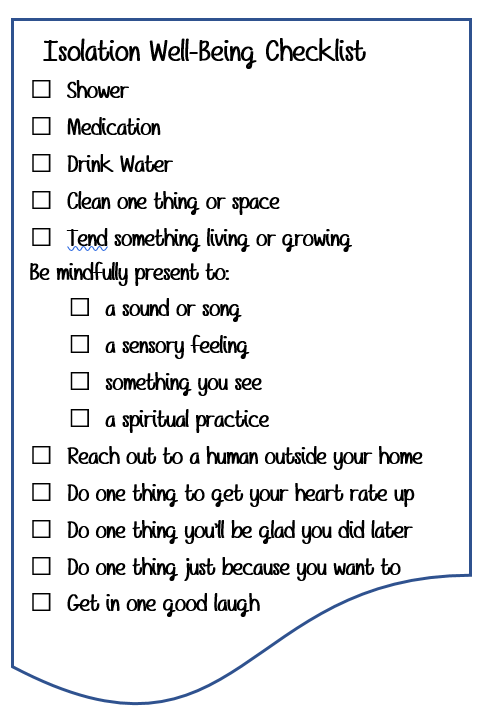
| When you have taken time to decompress and replenish your spirit, learn about the multiple ways that we can all work for social justice and change in our world. But, most importantly, be gentle with yourself. Stay well, stay safe and stay home if you are able… and, if you are one of the many who must go to work to or who chooses to volunteer to keep us safe, healthy, fed, informed or otherwise (relatively) sane, thank you. |
A recent RieOrganize! poll on Facebook came up with the following: Stay at home. Boredom. Facebook. Zoom meetings. Gratitude for front line workers. Frustration about having to wear a mask. Death. Telecommuting. Homeschooling. Social isolation.
Until recently, I knew of only a handful of friends who were dealing with COVID-19. Most were friends who live out of town or who were dealing with their friends/family members who were dealing with the virus. Yesterday, I was told that a friend is in the ICU with novel coronavirus. While we were not close friends, we did keep in touch over the 30+ years that I’ve known him and his husband.
What I realized today, however, was how much I did not know about them. For instance, who is my friend’s next of kin? My immediate answer would be, of course, his husband. But his husband died last week of a non-coronavirus-related illness. I don’t know if he has a health care directive or, if he does, who is listed as the alternate proxy because his husband just died – or where this document is located. I know that his husband took care of most of their financial, legal and daily responsibilities. I don’t know who will be responsible for all of that now and, more importantly, nor does anyone else. Everyone is scrambling to try to figure out what to do!
While this is indeed stressful and sad, I have to ask myself and you…
· How many of us or our friends or family members could find themselves in a similar situation?
· Have we taken care of our own medical, legal and financial paperwork? If we have, does anyone know where it is located or have easy access to it?
· Will you or someone you know find themselves sick or dying alone with no one who knows what you would want to happen medically or, if you should die, with your belongings?
According to our informal Facebook poll, not everything in our world today is discouraging, heartbreaking, disheartening or grim. Looking at some of the memes on Facebook or Instagram can make you smile or laugh out loud.
There is little wrong with cooking or baking too much, using Zoom or Facetime to be connected to friends, relatives and colleagues, binge watching Netflix or taking naps. There is much kindness, laughter and sharing. Neighbors are helping neighbors.
This can be a time of transformation – interpersonally, socially, economically and globally. It can be a time to focus on the people and things that are important in our lives.
And this is where we all come in to transform our world into a better place in which to live. Thinking about medical and financial preparedness is not high on most people’s lists of things they want to do, but, especially during this time, it is essential.
First, we should examine our own paperwork. How prepared are we? Then, we should take a look at our contact lists. Who do we know who may need help?
Few people want to talk about the possibility of being sick or dying. In this age of COVID-19, it is imperative that we do so and that we talk with those whom we love and help them to prepare as well.
This is something that cannot wait. Please take steps to ensure that someone will know what you want to happen if you are unable to speak for yourself.
Stay well, stay safe and stay home… and if you are one of the many who must go to work to keep us safe, healthy, fed, informed or otherwise (relatively) sane, thank you.
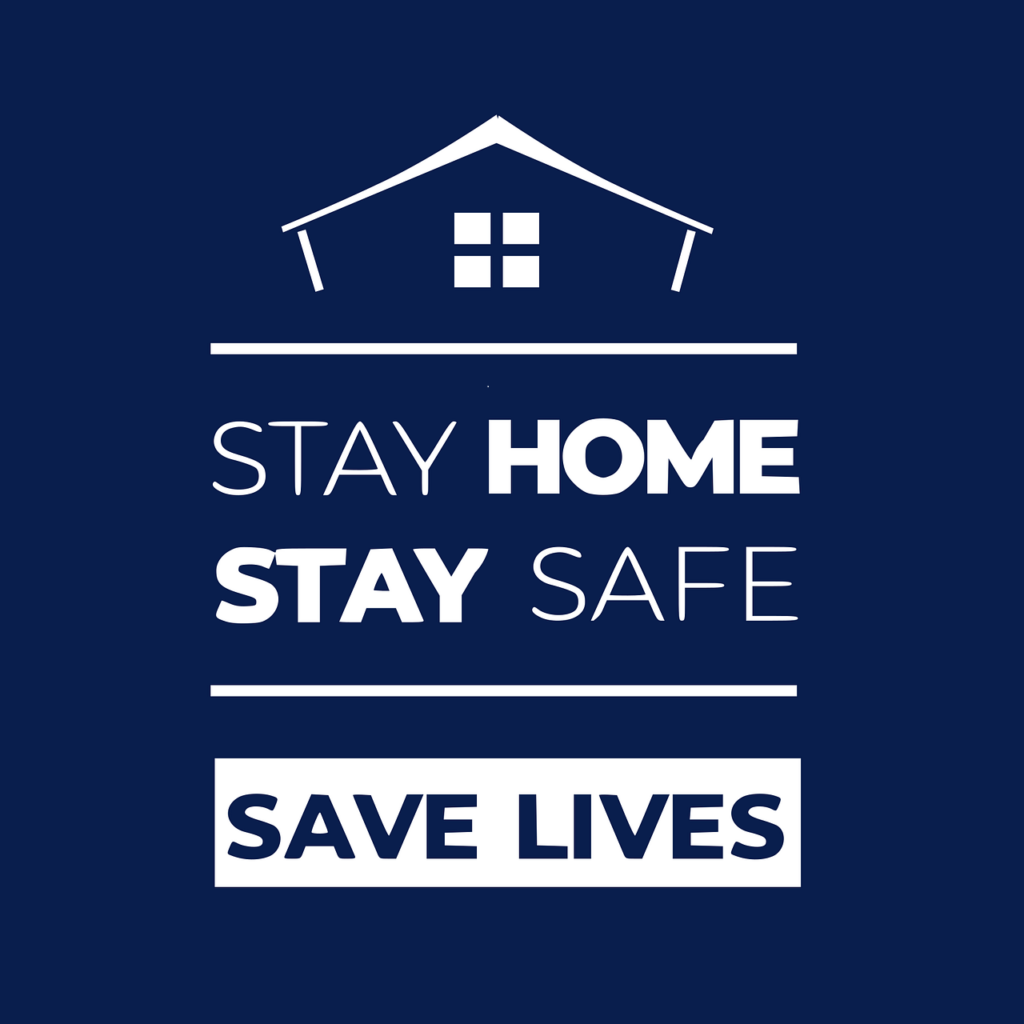
We all have too much paper in our lives. Diane, who is the business manager at RieOrganize! tells the following story:
“I have always had a fairly high tolerance for paper clutter before I reach my limit and, even then, it’s often not a conscious decision to sort through everything – I just start small and then usually keep going. The other day was one of those days. Although I missed being outside on a beautiful day, I opened the windows and just applied myself. The reward? Being able to sit back, that night, and look around at so many cleared off spaces with a sense of calm. AND I reaped the side benefit of finding two things for which I had been searching!”
Mail and other paper is a huge source of clutter for everyone. Every day your mailbox is full of paper, and 90% of it is probably useless to you.
Review the mail you get and look for opportunities to switch to paperless billing or automatic payments. You’ll eliminate the possibility of losing the electric bill in a pile of mail, plus you’ll have one less piece of mail coming to your house in the first place.
It’s important to have a system for processing mail. You know it’s coming every day, so figure out a system where you can sort it right away. Glance through the mail on your way back from the mailbox. Then when you’re in the house, toss junk mail in the recycle bin (or shredder if it includes personal information) and take immediate action on anything else.
Want to stop getting some of that junk mail altogether? Check out this resource from the Federal Trade Commission on ways to opt out of prescreened credit card offers, telemarketing calls, and other direct mail marketing.
WHAT TO KEEP AND WHAT TO TOSS?
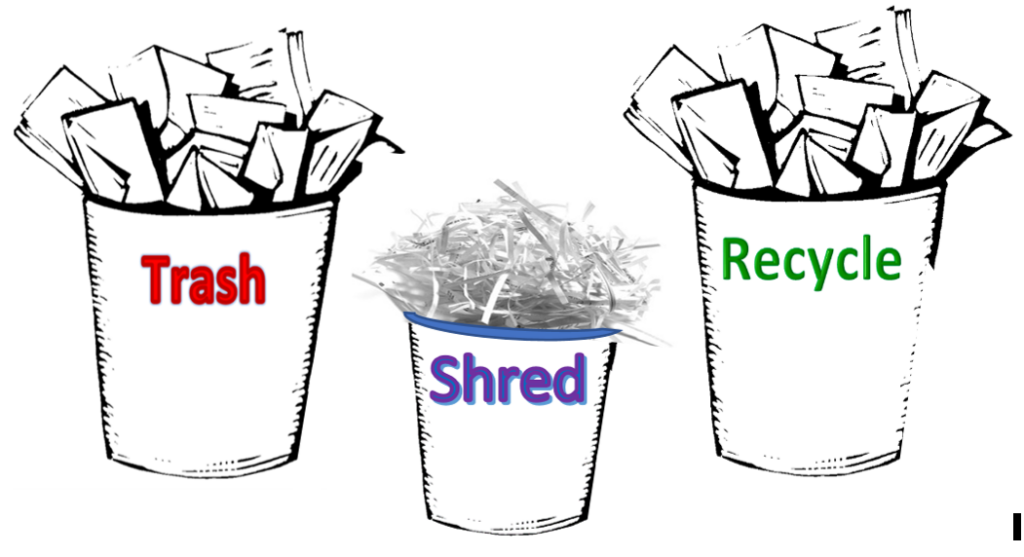
Keep:
You should keep your tax records safe and secure, whether they are stored on paper or electronically. The same is true for any financial or health records you store, especially any document bearing Social Security numbers.
Keep:
Keep copies of your tax returns and supporting documents for at least seven years. Remember to keep records about property you own for seven years after the year in which you no longer own the property. This time frame allows you to file a claim for adjustment in cases of bad debt deduction or a loss from worthless securities. Always check with your tax advisor for further clarification and updates in tax regulations as they change every year.
Toss:
Dispose of old tax records properly. Never toss paper tax returns and supporting documents into the trash. Because of the sensitive nature of this data, the loss or theft of these documents could lead to identity theft and have an economic impact. These documents contain the Social Security numbers of you, your spouse and dependents, old W-2 income and bank account information. Therefore, your federal and state tax records, as well as any financial or health records should be shredded before disposal.
Toss:
Lots of mail looks like it’s official and even says “keep this for your records”, but sometimes you really don’t need to if the same information can be found online. If you bank online, you don’t need to keep the monthly paper statements since you can access them through your online bank account. You should reconcile your account before shredding the statements, but you don’t need to file and store that paper indefinitely. The same can be done for paper bills, but if you took our tip above, you’ve enrolled in autopay and paperless billing and don’t have to worry about paper bills anymore.
Not all of us can be as diligent and apply ourselves as easily as Diane did, so if you need help sorting through your clutter, contact an organizer. For a list of NAPO organizers, click here
 Someday, you may be brought to a hospital in critical condition. You may be confused or unable to answer questions that are asked of you. You are not dead and, in actuality (and hopefully), you might not die.
Someday, you may be brought to a hospital in critical condition. You may be confused or unable to answer questions that are asked of you. You are not dead and, in actuality (and hopefully), you might not die.
If you are sedated and admitted to the hospital, how will the staff know who to contact and what you like or want?
When I worked as a hospital chaplain, I cared for a young man who was in a coma. The nursing staff realized that he became agitated when the room was quiet. His family brought in music from several of his favorite recording artists. When the music was played, he rested peacefully. How did his family know what to do? He told them in advance.
This can even help when the situation is not as critical. For instance, my wife, Naomi, hates to sleep with the blankets tucked tightly around her feet. If something should happen to her, I want to make sure that she is as comfortable as possible. Because I know her wishes, I will be able to relay this to the nursing staff.
While writing an Advance Directive is detailed and usually focuses mainly on end-of-life or death decisions, the following questions may help others care for you when you are critically ill.
Can you answer the following questions?
Remember, you may be healthy and active now, but don’t put off making some of these decisions today. Think of it like a health insurance policy. Hopefully you will never have to use it, but if you do, it is great to know it is available! Knowing what you want to happen is only the first step in the process. Writing your wishes down is the second. Telling someone whom you trust is essential.
Many of us focus on making resolutions that will benefit us individually, improve our lives (stick to my diet, exercise more, declutter the house). This year, I suggest that you do something different; something that is not only for yourself but will be appreciated and remembered by others. This year, I urge you to plan for the future by thinking about and documenting your end-of-life wishes and estate plan.

None of us know what the future will bring. Now, I wish all who are reading this a long, healthy and active life but as my mother used to say, “You never know if you will be hit by a bus.” Now is the time to plan and put into place systems that will serve you for the rest of your life.
Will
I challenge you to make this year’s resolutions ones that will benefit others as well as yourself. Remember, making these decisions in advance and communicating them to the appropriate people is a gift of love that is given to those who will have to make the decisions if /when you can’t. It is a kindness that will never be forgotten.